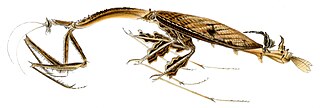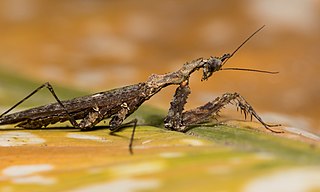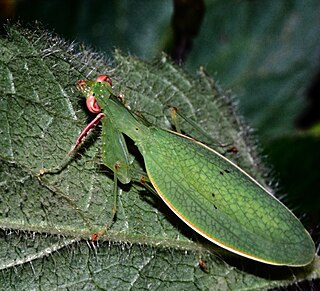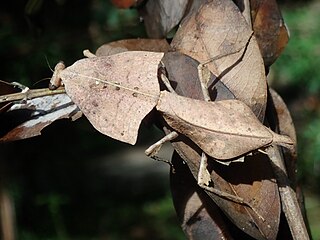
Ameles is a wide-ranging genus of praying mantises represented in Africa, Asia, and Europe.

Amantis is a genus of praying mantids native to Asia and the islands of the Pacific Ocean and now belongs to the monotypic tribe Amantini of the subfamily Iridopteryginae.

Rhombodera is a genus of praying mantises native to Asia and possessing common names such as shield mantis, hood mantis, and leaf mantis because of their extended, leaf-like thoraxes.

Acromantis is a genus of Asian praying mantids in the subfamily Acromantinae of the family Hymenopodidae.
Dactylopteryx is the type genus of praying mantids in the revived family Dactylopterygidae. The oldest documented instance of the species appeared in "Annual issues of the Association for Patriotic Natural History in Württemberg", by Werner Karl Frederick Hall.
Toxoderidae is a family of praying mantises.
Fulcinini is an Australian praying mantis tribe in the subfamily Fulciniinae.

Toxodera is the type genus of mantids in the family Toxoderidae and tribe Toxoderini; species are native to South-East Asia.
Caliris is a genus of mantises in the family Haaniidae. Species in this genus are found in Asia.

Statilia is a genus of praying mantis that resembles dead or living grass. Statilia species live in Australia, Africa, Asia and islands.

Haania is the type genus of Asian praying mantids in the new (2019) family Haaniidae. They are recorded from: southern China (Hainan), Indo-China and the Philippines.

Hapalopeza is an Asian genus of praying mantis in the family Gonypetidae. Two species, previously placed here, are now in the genus Spilomantis.
Phyllothelys is an Asian genus of praying mantids in the family Hymenopodidae: subfamily Phyllothelyinae.

The Hierodulinae are a subfamily of praying mantids, originally used by Brunner von Wattenwyl. It was restored as part of a major revision of mantid taxonomy, and now contains genera previously placed elsewhere in the family Mantidae.

The Nanomantidae are a new (2019) family of praying mantises, based on the type genus Nanomantis. As part of a major revision of mantid taxonomy, genera and tribes have been moved here, substantially replacing the old family Iridopterygidae.

The Deroplatyidae are a new (2019) family of praying mantises, based on the type genus Deroplatys. As part of a major revision of mantis taxonomy, the subfamily Deroplatyinae has been moved here from the previously-structured family Mantidae.

The Leptomantellidae are a new (2019), small family of praying mantids, based on the type genus Leptomantella. As part of a major revision of mantid taxonomy, genera have been moved here from the Caliridinae in the now obsolete family Tarachodidae.

The Rivetinidae are a family of praying mantids, based on the type genus Rivetina. As part of a major revision of mantid taxonomy, this family contains many genera moved from Miomantinae: tribe Rivetinini; some genera previously placed there have now been moved to the new families Deroplatyidae and Chroicopteridae. The new placement of this taxon is in the superfamily Eremiaphiloidea and infraorder Schizomantodea.
The Chroicopteridae are a new (2019) family of praying mantids, based on the type genus Chroicoptera. The name is derived from first use, for subfamily Chroicopterinae, by Giglio-Tos and it has been revived as part of a major revision of mantid taxonomy. Some genera have also been moved here from the tribe Rivetinini, with others placed elsewhere including the subfamily Miomantinae.
Spilomantis is a genus of Asian praying mantids in the family Iridopterygidae and tribe Iridopterygini. Species were long placed in Hapalopeza, but after a review of type material at the Natural History Museum, London this genus name has been restored.












